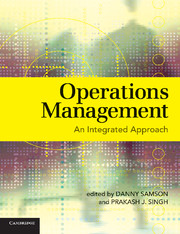Book contents
- Frontmatter
- Contents
- List of Contributors
- Preface
- Acknowledgements
- Part I Operations within Organisations – Building Blocks
- Part II Approaches to Understanding OM
- 5 Strategic Approach to Operations Management
- 6 Processes and Systems in Operations Management
- 7 Supply Chain or Network Approach to Operations Management
- Part III Moving Forward with OM – Creating Competitive Advantage
- Part IV Challenges and Opportunities in Operations
- Part V Case Studies
- Index
- References
6 - Processes and Systems in Operations Management
Published online by Cambridge University Press: 05 June 2012
- Frontmatter
- Contents
- List of Contributors
- Preface
- Acknowledgements
- Part I Operations within Organisations – Building Blocks
- Part II Approaches to Understanding OM
- 5 Strategic Approach to Operations Management
- 6 Processes and Systems in Operations Management
- 7 Supply Chain or Network Approach to Operations Management
- Part III Moving Forward with OM – Creating Competitive Advantage
- Part IV Challenges and Opportunities in Operations
- Part V Case Studies
- Index
- References
Summary
Learning objectives
After reading this chapter, you should be able to:
understand the meaning of processes and the role they play in organisations
appreciate the characteristics of generic process types
realise how various standard operating system layouts result from the generic process types
understand how ‘people management’ and technology affect process design considerations
understand how processes can be analysed and measured
recognise the scheduling issues associated with different process types.
Box 6.1: Managerial challenge: call centre processes
Brisbane City Council is the largest local government in Australia. It provides traditional civic services to close to one million people. These services include water supply, sewerage treatment, refuse collection, pet registration, library facilities, public health services, public transportation, roads and parks maintenance, city planning, building services, etc. The council spends over $1.5 billion on these services and employs over 6000 workers.
At the insistence of then Lord Mayor Jim Soorley, who had become frustrated with the council's inability to respond in a timely manner to ratepayers needs, a call centre was set up in 1996. The stated objectives of the call centre were: (1) to add value to the council's operational areas; (2) 90 per cent of all calls to be answered in 20 seconds; and (3) 90 per cent of all calls were to be handled at point of entry. The call centre started with 40 employees answering about 1200 calls daily for a handful of the council's departments. In 1997, 24-hour service was introduced. […]
- Type
- Chapter
- Information
- Operations ManagementAn Integrated Approach, pp. 161 - 200Publisher: Cambridge University PressPrint publication year: 2008



